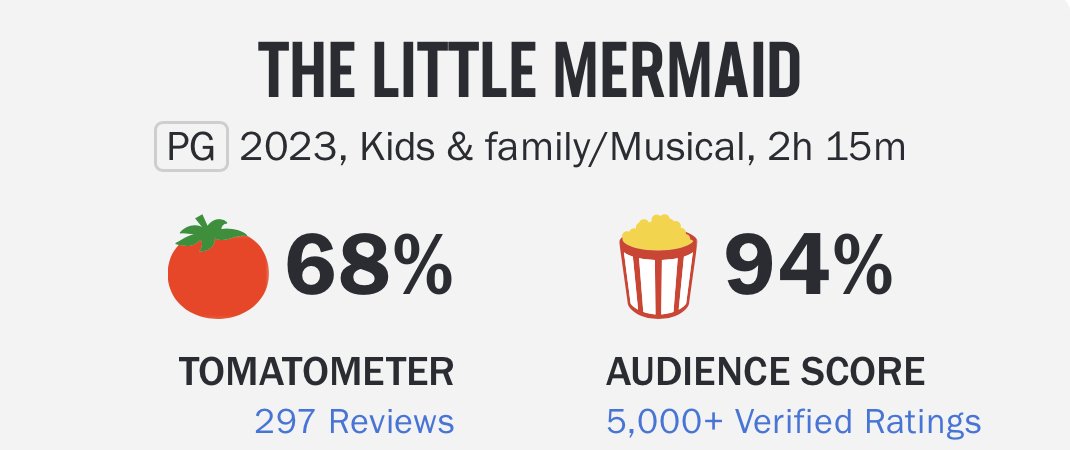The latest Disney live-action/CGI remake of an animated classic, “The Little Mermaid”, might not be as well-regarded by audiences as we were led to believe.
Review sites are apparently providing cover for the Disney flick. Why? I’m not entirely sure. All we can do is speculate.
On 05.29.23 I wrote:
The Rotten Tomatoes audience score seems to be overkill. We have another ‘Woman King’ situation on our hands. I understand Fandango wants to make the film look good, but at least be subtle about it. Most of the scores are 5/5 scores with very short "reviews" and then just a few scattered mixed or negative reviews included.
I’m now going to expand on these thoughts. I’ve received a lot of emails these past few days about very topic, including one from an anonymous Fandango employee. They have all led to me the below facts.
Apparently, IMDB activated an “alternate weighting calculation” to compensate for alleged “unusual activity” in reviews for “The Little Mermaid”.
The IMDB page warns visitors, “Our rating mechanism has detected unusual voting activity on this title. To preserve the reliability of our rating system, an alternate weighting calculation has been applied.”
A true average of the ratings gives ‘Little Mermaid’ a 4.6/10 from audiences, while the “official” weighted average gives the film a 7/10 rating. That’s a big difference.
Of course, the obvious reason for them to behave in this manner is to combat the inevitable “review-bombing” that was going to occur against the film, which was due to the casting of Ariel with black actress Halle Bailey.
This “review bombing” campaign, according to IMDB, led to more than 40% of the film’s ratings being one-star ratings, spanning multiple countries. So, if there was a campaign to downgrade the film’s rating, it did not just exclusively occur in the United States, but rather in dozens of countries across the globe.
Its not just IMDB. Rotten Tomatoes seem to have also adjusted their user ratings to boost “The Little Mermaid.” Forbes noticed the anomalies and wrote a whole piece about it:
The live-action remake of The Little Mermaidis now scoring much higher with audiences than the 1989 animated classic, which sits at 88% with audiences and 92% with critics. Are we to believe that moviegoers love the remake even more than the original? That certainly wasn’t the case with Beauty and the Beast, which fared better with critics and audiences as a cartoon by a wide margin.
“The Little Mermaid” currently has a 56% user rating when compared to the 95% score from its “verified audience.” Rotten Tomatoes picked and chose the reviews they deemed acceptable for the film. Not a very democratic way to conduct the aggregate.
So, what’s happening? Yes, I get it, these review aggregate sites want to protect themselves from the race-swapping casting backlash. However, these sites are artificially creating the impression that the film is universally liked.
Then again, if you’re not “cooking” the books like RT and IMDB are doing and are instead, honestly, counting every user “review” then the result will be what Metacritic has a tallied: a user score of 2.2/10.
However, what the likes of Rotten Tomatoes and Metacritic can’t really control is publication reviews. Critics have been more lukewarm towards the film — “The Little Mermaid” has a 68 on Rotten Tomatoes and 59 on Metacritic.
I haven’t seen the film, I missed the press screening when I was at Cannes and have no intention of paying to see it.






